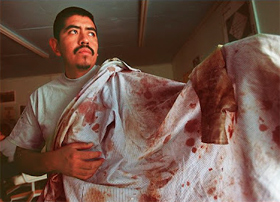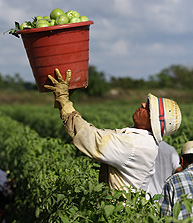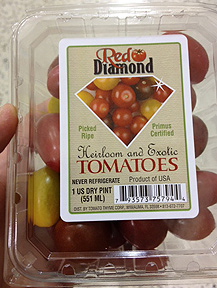The more things change?...
|
November, 1996
 |
March, 2012
 |
No, actually. The more
things change, the more the old guard fights to keep things the same. But it
isn't 1996 anymore...
The two bloody shirts pictured above trace the trajectory of the
CIW's two-decade old fight for fundamental human rights in Florida's fields, a
fight to eliminate the constant undercurrent of violence which has haunted the
fields for far too long.
The shirt on the left belonged to a young man who walked into the
CIW's office in November, 1996. He had been picking tomatoes in a field near
Immokalee when he stopped to take a drink of water. A field supervisor accosted
him, shouted "Are you here to work, or to drink water?", and launched
into him, leaving him badly bruised and bloodied -- and
determined to find justice. The young worker walked back to Immokalee,
headed straight to the CIW office, and sparked a nighttime march of nearly 500
workers on the crewleader's house. The marchers brandished his shirt as a
banner, declaring "If you beat one of us, you beat us all!", and helped
launch a movement that changed Immokalee forever.
The shirt on the right belonged to a young man who walked into the
CIW's office last week. He had been working at a vegetable packing house,
packing eggplants, about 10 miles from Immokalee when a supervisor approached
him. According to the worker, the supervisor criticized his work, and he,
thinking the criticism unjustified, answered back. A discussion ensued when,
according to the worker and a witness, the supervisor hauled off and punched him
in the face. Staggered, he swung back, but was knocked to the ground by the
supervisor before others in the area stepped in to pull them apart.  The worker was told to go home, clean up, and return the
next day. Instead, he went to the CIW's office, and filed a police report. He
then went to the hospital, where he learned that the supervisor's punch had
broken his nose.
The worker was told to go home, clean up, and return the
next day. Instead, he went to the CIW's office, and filed a police report. He
then went to the hospital, where he learned that the supervisor's punch had
broken his nose.
 The worker was told to go home, clean up, and return the
next day. Instead, he went to the CIW's office, and filed a police report. He
then went to the hospital, where he learned that the supervisor's punch had
broken his nose.
The worker was told to go home, clean up, and return the
next day. Instead, he went to the CIW's office, and filed a police report. He
then went to the hospital, where he learned that the supervisor's punch had
broken his nose.
One might see the two shirts -- these two incidents of inexcusable
violence against workers that they symbolize -- and conclude that little has
changed for farmworkers in Florida. But that would be wrong.
In fact, the punching of the worker at an eggplant packing house
last week -- like the incident, also just last week, in a Plant City strawberry
field where a farmer was caught on video screaming violently at workers for
picking his berries poorly, calling them "damn animals" that "ain't
worth a sh*t" (the original video has been removed, but a short audio recording
remains) -- only underscores just how much has changed in the tomato fields
where the Fair Food Program is in effect.
"A man can't ride your back unless it is
bent"...
Those words were spoken by Dr. Martin Luther King on the eve of
his assassination, in his ever powerful "Mountaintop"
speech in Memphis, Tennessee, April 3, 1968. Speaking about the Civil Rights
movement in Albany, Georgia, he said, "Whenever men and women straighten their
backs up, they are going somewhere, because a man can't ride your back unless it
is bent."
 Today, in tomato fields across
the state of Florida, the men and women who pick this country's tomatoes are
indeed going somewhere, through the Fair Food Program. Not only have they won
new rights and protections against exploitation and abuse (verbal and physical),
but they are learning about those rights, on the farm and on the clock, through
the CIW's educational efforts, and are enforcing those rights through the Fair
Food Program's protected complaint mechanism.
Today, in tomato fields across
the state of Florida, the men and women who pick this country's tomatoes are
indeed going somewhere, through the Fair Food Program. Not only have they won
new rights and protections against exploitation and abuse (verbal and physical),
but they are learning about those rights, on the farm and on the clock, through
the CIW's educational efforts, and are enforcing those rights through the Fair
Food Program's protected complaint mechanism.
They are straightening their backs up, and -- in a true
partnership with those growers who have made a real commitment to the Fair Food
Program -- taking steps to eliminate violence and humiliation in Florida's
tomato fields, to end the long nightmare of the state's Harvest of Shame.
That is not to say that all is right in the fields where the Fair
Food Program is in effect. But it does mean that workers and employers
determined to improve conditions in the tomato industry now have real, effective
tools with which to identify and eliminate the abusive bosses and exploitative
structures that have plagued the industry for decades. And they have done so
this season, time and time again, on participating farms from Homestead to
Ruskin.
 But what's even
more interesting is what's happening at farms outside of the Fair Food
Program -- whether they are vegetable fields outside the tomato industry, or
tomato fields where growers have refused to join the Program. With increasing
frequency, the CIW and Program auditors are receiving complaints from workers
who, having picked tomatoes on participating growers' farms earlier in the
season, now find themselves working for companies beyond the reach of
the Program, where conditions are every bit as harsh and demeaning as they ever
were.
But what's even
more interesting is what's happening at farms outside of the Fair Food
Program -- whether they are vegetable fields outside the tomato industry, or
tomato fields where growers have refused to join the Program. With increasing
frequency, the CIW and Program auditors are receiving complaints from workers
who, having picked tomatoes on participating growers' farms earlier in the
season, now find themselves working for companies beyond the reach of
the Program, where conditions are every bit as harsh and demeaning as they ever
were.
These workers, who received the orientation on workers' rights
under the Fair Food Code of Conduct at a participating farm, confirm the
positive impact of the Program every time they call with complaints ranging from
verbal and physical harassment to forced overfilling of buckets and systemic
minimum wage violations on non-participating farms.
Having seen the New Day taking shape in participating growers'
fields, they are shocked anew at the conditions as they used to be, and continue
to be, in fields outside the Fair Food Program. And while the distinction is
good news for workers on the participating farms, it is also good news for the
participating growers themselves, who, thanks to the more humane workplace
environment they are creating this season, are better able to attract and retain
workers, leading to lower turnover, reduced training costs, and higher
productivity.
But not everyone is pleased with these unprecedented changes.
It takes two to exploit farmworkers...
Without an outlet for produce brought to market in violation of
workers' fundamental human rights, growers who have turned their backs on the
Fair Food Program would have to raise their  standards
or go out of business. So, where does an old school grower turn to sell his
tomatoes, eggplants, or strawberries with no questions asked?
standards
or go out of business. So, where does an old school grower turn to sell his
tomatoes, eggplants, or strawberries with no questions asked?
 standards
or go out of business. So, where does an old school grower turn to sell his
tomatoes, eggplants, or strawberries with no questions asked?
standards
or go out of business. So, where does an old school grower turn to sell his
tomatoes, eggplants, or strawberries with no questions asked?Yes, Publix, for one, is happy to buy tomatoes produced where workers do not enjoy the protections and oversight provided by the Fair Food Program. Publix sells several brands of Florida tomatoes from farms that have not agreed to the new human rights standards, like the Red Diamond tomatoes pictured above, purchased recently at a Naples area store. And Publix is all too happy to provide the public support necessary to encourage recalcitrant growers to continue resisting change, as it has done time and time again in response to the Campaign for Fair Food."If there are some atrocities going on, it’s not our business.""We do not intervene in labor disputes between suppliers and their employees.""If productivity standards are too strenuous, farmworkers should work for another employer."
Dehumanization makes it all possible...
Why, when the option to support a more modern, more humane
agricultural industry exists, does Publix insist on doing things the old way?

You can't break another human being's nose just because he had the
temerity to speak back to you, unless you don't see him as a fellow human being.
You can't sexually assault a woman who works for you if, in her, you see your
mother, your sister, or your daughter.  You can't steal
another person's freedom and force them to work at the barrel of a gun if you
see that person as fundamentally equal to you. It's just not possible. And you
can't turn your back on those conditions when deciding where to buy the produce
you sell unless you share the perspective that farmworkers are, in some defining
measure, less fully human than you.
You can't steal
another person's freedom and force them to work at the barrel of a gun if you
see that person as fundamentally equal to you. It's just not possible. And you
can't turn your back on those conditions when deciding where to buy the produce
you sell unless you share the perspective that farmworkers are, in some defining
measure, less fully human than you.
 You can't steal
another person's freedom and force them to work at the barrel of a gun if you
see that person as fundamentally equal to you. It's just not possible. And you
can't turn your back on those conditions when deciding where to buy the produce
you sell unless you share the perspective that farmworkers are, in some defining
measure, less fully human than you.
You can't steal
another person's freedom and force them to work at the barrel of a gun if you
see that person as fundamentally equal to you. It's just not possible. And you
can't turn your back on those conditions when deciding where to buy the produce
you sell unless you share the perspective that farmworkers are, in some defining
measure, less fully human than you.
Think about the worker you saw at the top of this post who was
beaten at the packing house last week. As long as he is defined as "a worker"
and the details are about the facts of the assault, you may see him one way. But
what if we were to tell you that he has lived and worked in Immokalee with his
family for eleven years, teaching himself how to drive a forklift to try to get
ahead, to be a better provider for his family. That he is a husband and the
father of two beautiful young boys, 8 and 3, and that his youngest, whom he
loves dearly, is severely disabled and can't walk, eat, or breathe on his own?
You might begin to see him differently, as your neighbor, a member of your
community, a human being.
But for Publix and for still too many growers in Florida, farmworkers remain
faceless, nameless, "hands" -- tools needed to bring in the harvest. Tools that,
when they wear out, or are damaged, are simply replaced with other tools without
a moment's hesitation or regret. But it's
2012, not 1996, and that attitude no longer puts a company in the mainstream of
Florida agriculture, not to mention the retail food industry. Today, the vast
majority of Florida's tomato growers have recognized the mistakes of the past
and are making, through significant investments of time and resources dedicated
to meeting the higher standards of the Fair Food Program, a true commitment to a
more socially responsible, more humane work environment.
But it's
2012, not 1996, and that attitude no longer puts a company in the mainstream of
Florida agriculture, not to mention the retail food industry. Today, the vast
majority of Florida's tomato growers have recognized the mistakes of the past
and are making, through significant investments of time and resources dedicated
to meeting the higher standards of the Fair Food Program, a true commitment to a
more socially responsible, more humane work environment. And today, more and more consumers are no longer happy to buy the food they eat, the food they put on their families' tables, no questions asked, even if Publix still is. Consumers are demanding to know the story behind their food, but violence, sexual harassment, and grinding poverty are not the story they want to hear.
It is not 1996 anymore, where the only people outraged when a young worker comes back from work bloodied and beaten are his fellow workers in Immokalee. And until Publix realizes that simple fact, they will get more and more letters like this one, with which we will close today's post, from Brendan and Alison Conley of Temple Terrace, Florida. Mr. and Mrs. Conley, you have the final word:
|
Dear Friends at Publix: We love Publix. But we can't shop there. We grew up shopping at Publix. Until recently, we bought nearly all of our groceries there. But we won't be back, not until one thing changes. The people who pick our tomatoes, represented by the Coalition of Immokalee Workers, haven't had a raise in 30 years. They're asking you to pay a penny per pound more, and you have refused to even meet with them. We've heard your response already: this has nothing to do with Publix; it's between the growers and the workers. We see through that. If Publix told the growers that they had to pay the workers a penny per pound more, would they really refuse? Who's really calling the shots? Does that mean Publix is the boss? No. We the consumers are. So we're sorry, Publix, but we're going to have to let you go. Come back to us when you've cleaned up your act. Sincerely, Brendan Conley Alison Conley |

No comments:
Post a Comment